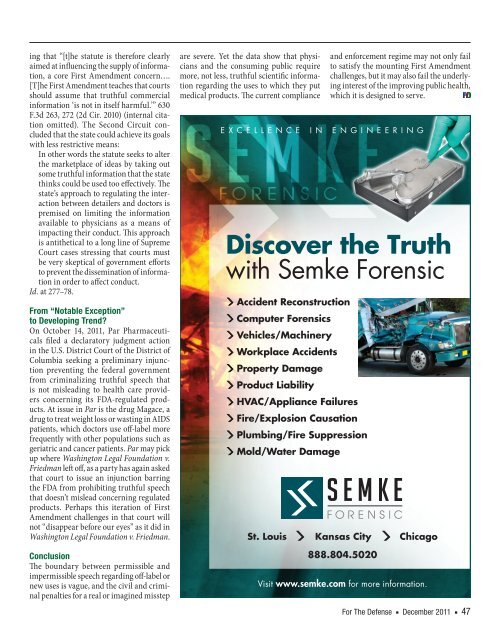For The Defense, December 2011 - DRI Today
For The Defense, December 2011 - DRI Today
For The Defense, December 2011 - DRI Today
Create successful ePaper yourself
Turn your PDF publications into a flip-book with our unique Google optimized e-Paper software.
ing that “[t]he statute is therefore clearly<br />
aimed at influencing the supply of information,<br />
a core First Amendment concern….<br />
[T]he First Amendment teaches that courts<br />
should assume that truthful commercial<br />
information ‘is not in itself harmful.’” 630<br />
F.3d 263, 272 (2d Cir. 2010) (internal citation<br />
omitted). <strong>The</strong> Second Circuit concluded<br />
that the state could achieve its goals<br />
with less restrictive means:<br />
In other words the statute seeks to alter<br />
the marketplace of ideas by taking out<br />
some truthful information that the state<br />
thinks could be used too effectively. <strong>The</strong><br />
state’s approach to regulating the interaction<br />
between detailers and doctors is<br />
premised on limiting the information<br />
available to physicians as a means of<br />
impacting their conduct. This approach<br />
is antithetical to a long line of Supreme<br />
Court cases stressing that courts must<br />
be very skeptical of government efforts<br />
to prevent the dissemination of information<br />
in order to affect conduct.<br />
Id. at 277–78.<br />
From “Notable Exception”<br />
to Developing Trend?<br />
On October 14, <strong>2011</strong>, Par Pharmaceuticals<br />
filed a declaratory judgment action<br />
in the U.S. District Court of the District of<br />
Columbia seeking a preliminary injunction<br />
preventing the federal government<br />
from criminalizing truthful speech that<br />
is not misleading to health care providers<br />
concerning its FDA- regulated products.<br />
At issue in Par is the drug Magace, a<br />
drug to treat weight loss or wasting in AIDS<br />
patients, which doctors use off- label more<br />
frequently with other populations such as<br />
geriatric and cancer patients. Par may pick<br />
up where Washington Legal Foundation v.<br />
Friedman left off, as a party has again asked<br />
that court to issue an injunction barring<br />
the FDA from prohibiting truthful speech<br />
that doesn’t mislead concerning regulated<br />
products. Perhaps this iteration of First<br />
Amendment challenges in that court will<br />
not “disappear before our eyes” as it did in<br />
Washington Legal Foundation v. Friedman.<br />
Conclusion<br />
<strong>The</strong> boundary between permissible and<br />
impermissible speech regarding off- label or<br />
new uses is vague, and the civil and criminal<br />
penalties for a real or imagined misstep<br />
are severe. Yet the data show that physicians<br />
and the consuming public require<br />
more, not less, truthful scientific information<br />
regarding the uses to which they put<br />
medical products. <strong>The</strong> current compliance<br />
and enforcement regime may not only fail<br />
to satisfy the mounting First Amendment<br />
challenges, but it may also fail the underlying<br />
interest of the improving public health,<br />
which it is designed to serve.<br />
<strong>For</strong> <strong>The</strong> <strong>Defense</strong> ■ <strong>December</strong> <strong>2011</strong> ■ 47

















